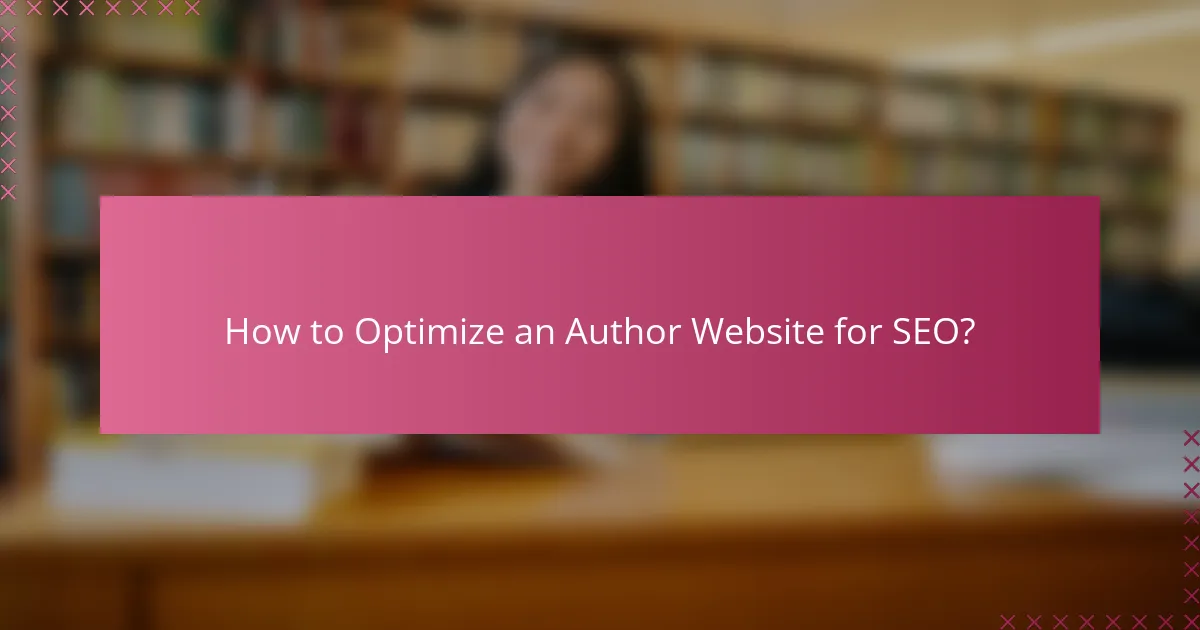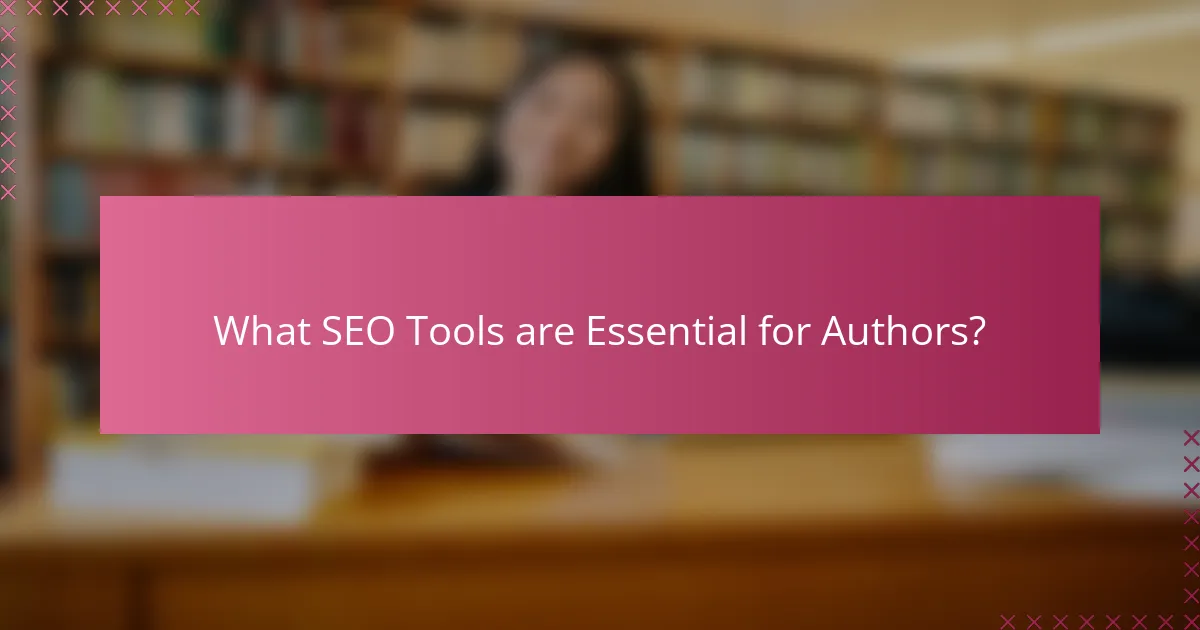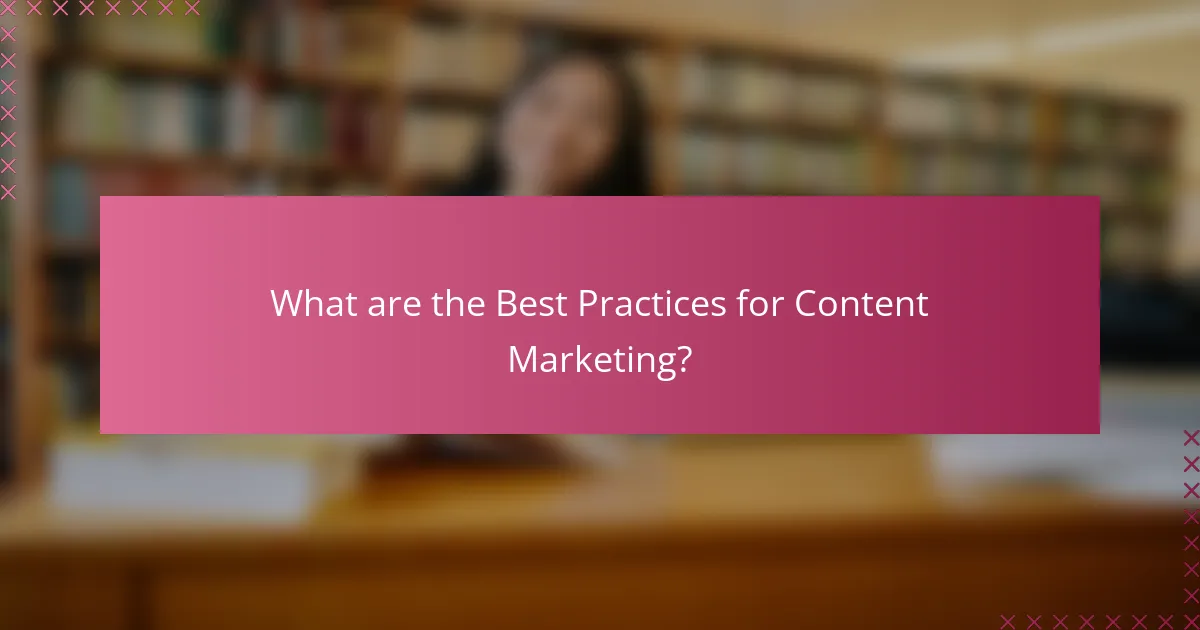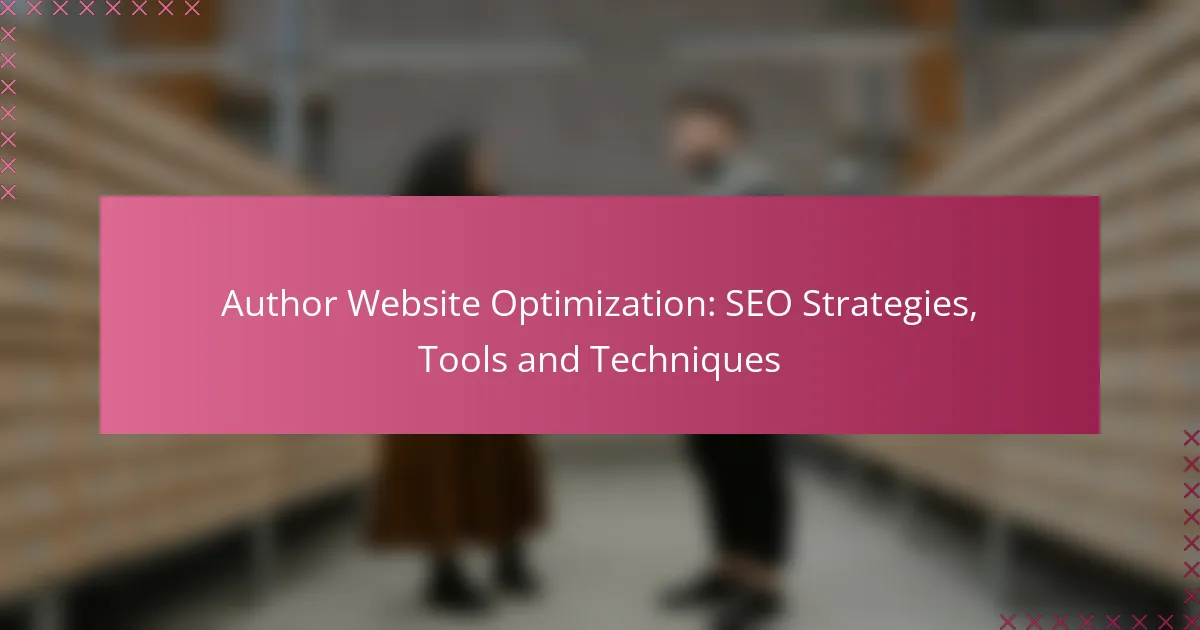Optimizing an author website for SEO is crucial for increasing visibility in search engines and attracting a wider audience. By implementing targeted strategies such as keyword research, on-page SEO, and mobile optimization, authors can enhance their online presence. Utilizing essential tools like Google Analytics and SEMrush can further streamline marketing efforts and improve website performance.

How to Optimize an Author Website for SEO?
To optimize an author website for SEO, focus on enhancing visibility in search engines through targeted strategies. This involves keyword research, on-page SEO, high-quality content, mobile optimization, and improving page speed.
Keyword Research Techniques
Keyword research is essential for identifying the terms potential readers use to find content similar to yours. Utilize tools like Google Keyword Planner, Ahrefs, or SEMrush to discover relevant keywords with good search volume and manageable competition.
Consider long-tail keywords, which are more specific phrases that often have lower competition. For example, instead of targeting “fiction books,” aim for “best fiction books for young adults.” This can help attract a more targeted audience.
On-Page SEO Best Practices
On-page SEO involves optimizing individual pages to rank higher and earn more relevant traffic. Ensure that your title tags, meta descriptions, and headers include your primary keywords naturally.
Use descriptive alt text for images and maintain a clean URL structure. For instance, a URL like “www.yourwebsite.com/author-name-books” is more effective than “www.yourwebsite.com/page1.” This clarity helps both users and search engines understand your content better.
Content Quality and Relevance
High-quality, relevant content is crucial for engaging readers and improving SEO. Aim to create informative articles, blog posts, or book excerpts that resonate with your audience’s interests and needs.
Regularly update your content to keep it fresh and relevant. Incorporate multimedia elements like images or videos to enhance user experience and encourage longer visits, which can positively impact your SEO rankings.
Mobile Optimization Strategies
With a significant portion of web traffic coming from mobile devices, optimizing your author website for mobile is essential. Ensure your site is responsive, meaning it adjusts seamlessly to different screen sizes.
Use larger fonts and touch-friendly buttons to enhance usability on mobile devices. Test your site using Google’s Mobile-Friendly Test tool to identify and fix any issues that could hinder mobile user experience.
Page Speed Improvement Tips
Page speed is a critical factor for both user experience and SEO. Aim for your pages to load in under three seconds to reduce bounce rates. Tools like Google PageSpeed Insights can help analyze your site’s performance.
To improve speed, optimize images by compressing them without losing quality, leverage browser caching, and minimize the use of heavy scripts. Consider using a Content Delivery Network (CDN) to distribute your content more efficiently across various locations.

What SEO Tools are Essential for Authors?
Authors can significantly enhance their online presence by utilizing essential SEO tools that streamline their marketing efforts. Key tools like Google Analytics, SEMrush, and Yoast SEO provide valuable insights and functionalities to optimize website performance and visibility.
Google Analytics for Tracking
Google Analytics is a powerful tool that allows authors to track website traffic and user behavior. By setting up goals and monitoring key metrics, authors can understand how visitors interact with their content, which pages attract the most attention, and where traffic originates.
To get started, create a Google Analytics account and add the tracking code to your website. Regularly review reports on audience demographics, acquisition channels, and behavior flow to identify trends and areas for improvement.
SEMrush for Keyword Analysis
SEMrush is an all-in-one tool that helps authors conduct keyword research and analyze their competition. By identifying relevant keywords with high search volume and low competition, authors can tailor their content to attract more readers.
Utilize SEMrush’s Keyword Magic Tool to generate keyword ideas and assess their difficulty scores. Focus on long-tail keywords that reflect your niche, and consider creating content around these terms to improve your search engine rankings.
Yoast SEO for WordPress
Yoast SEO is a popular plugin for WordPress that simplifies on-page SEO optimization. It provides real-time feedback on content readability, keyword usage, and meta descriptions, ensuring that authors adhere to best practices.
After installing Yoast, follow its recommendations for optimizing titles, headings, and alt texts for images. Regularly check the SEO analysis feature to enhance your posts and pages, making them more appealing to both search engines and readers.

How to Build Backlinks for an Author Website?
Building backlinks for an author website involves acquiring links from other reputable sites to improve your site’s authority and search engine ranking. Effective strategies include guest blogging, networking with fellow authors, and leveraging social media platforms.
Guest Blogging Opportunities
Guest blogging allows authors to write articles for other websites, providing valuable content in exchange for a backlink to their own site. Identify blogs in your genre or niche that accept guest posts and ensure they have a good reputation and audience engagement.
When pitching your guest post idea, focus on topics that resonate with the host site’s audience. Include a brief author bio with a link to your website to maximize exposure. Aim for a few high-quality guest posts each month to steadily build your backlink profile.
Networking with Other Authors
Networking with other authors can lead to mutual backlink opportunities. Attend literary events, join writing groups, or participate in online forums to connect with peers. Building genuine relationships can result in authors linking to each other’s websites.
Consider collaborating on projects, such as anthologies or joint promotions, where you can naturally include backlinks to each other’s sites. Regular communication and support can foster long-term partnerships that enhance your online visibility.
Utilizing Social Media Platforms
Social media platforms are powerful tools for building backlinks. Share your content on platforms like Twitter, Facebook, and Instagram, encouraging others to link back to your site. Engage with your audience by responding to comments and participating in discussions to increase your reach.
Join relevant groups or communities where you can share your expertise and link to your articles when appropriate. Be mindful of each platform’s guidelines to avoid being perceived as spammy, and focus on providing value to your audience.

What are the Best Practices for Content Marketing?
Best practices for content marketing involve creating valuable, relevant content that attracts and engages your target audience. This includes understanding your audience’s needs, optimizing for search engines, and utilizing various content formats to maximize reach and effectiveness.
Creating Engaging Blog Posts
Engaging blog posts are essential for attracting readers and keeping them on your site. Start with a compelling headline and ensure your content is informative, well-structured, and easy to read. Use short paragraphs, bullet points, and images to break up text and enhance readability.
Consider incorporating storytelling techniques to make your posts relatable. Aim for a conversational tone and address your readers directly. Regularly update your blog with fresh content to improve SEO and keep your audience engaged.
Email Marketing Strategies
Email marketing remains a powerful tool for content distribution and audience engagement. Build a targeted email list by offering incentives such as exclusive content or discounts. Segment your audience based on interests to send personalized messages that resonate.
Craft attention-grabbing subject lines and ensure your emails are mobile-friendly. Monitor metrics like open rates and click-through rates to refine your approach. Avoid overwhelming subscribers with too many emails; a consistent schedule, such as weekly or bi-weekly, often works best.
Utilizing Video Content
Video content is increasingly popular and can significantly enhance your content marketing strategy. Create short, engaging videos that convey your message clearly and concisely. Platforms like YouTube and social media channels can help you reach a broader audience.
Consider live streaming events or Q&A sessions to interact with your audience in real-time. Ensure your videos are optimized for SEO by using relevant keywords in titles and descriptions. Keep videos under a few minutes for maximum viewer retention and engagement.

How to Measure SEO Success for Author Websites?
Measuring SEO success for author websites involves tracking specific metrics that indicate how well your site is performing in search engines. Key indicators include organic traffic, user engagement, and conversion rates, which help assess the effectiveness of your SEO strategies.
Key Performance Indicators (KPIs)
Key Performance Indicators (KPIs) are essential metrics that help authors gauge their website’s SEO performance. Common KPIs include organic traffic volume, keyword rankings, and conversion rates, which reflect how many visitors take desired actions, such as signing up for a newsletter or purchasing a book.
To effectively measure these KPIs, set clear goals and benchmarks. For example, aim for a specific percentage increase in organic traffic over a set period. Regularly review these metrics to adjust your strategies as needed.
Tracking Organic Traffic Growth
Tracking organic traffic growth is crucial for understanding how well your SEO efforts are attracting visitors. Use tools like Google Analytics to monitor the number of visitors coming from search engines and identify trends over time.
Consider setting monthly or quarterly targets for organic traffic growth. A reasonable goal might be to increase traffic by 10-20% each quarter. Analyze which content drives the most traffic to refine your SEO strategies accordingly.
Monitoring Bounce Rates
Monitoring bounce rates helps assess user engagement on your author website. A high bounce rate may indicate that visitors are not finding what they expect or that your content is not engaging enough.
To lower bounce rates, ensure your website loads quickly and provides relevant, high-quality content. Aim for a bounce rate below 50% as a general benchmark, but remember that this can vary by niche and audience. Regularly review your analytics to identify pages with high bounce rates and consider optimizing them for better user experience.

What are the Emerging Trends in Author Website SEO?
Emerging trends in author website SEO focus on enhancing user experience, optimizing for voice search, and leveraging AI-driven tools. These trends aim to improve visibility and engagement, ensuring authors can reach their target audience effectively.
Voice Search Optimization
Voice search optimization is becoming increasingly important as more users rely on voice-activated devices. Authors should focus on natural language processing and long-tail keywords that reflect how people speak. This includes creating content that answers common questions succinctly.
To optimize for voice search, consider using structured data to help search engines understand your content better. Implementing FAQ sections on your website can also enhance visibility in voice search results.
Mobile-First Design
With a significant portion of web traffic coming from mobile devices, a mobile-first design is essential for author websites. This approach prioritizes mobile usability, ensuring that your site is responsive and loads quickly on smartphones and tablets.
Key elements of mobile-first design include simplified navigation, larger buttons, and fast-loading images. Tools like Google’s Mobile-Friendly Test can help assess your website’s performance on mobile devices.
Content Quality and E-A-T Principles
Content quality is paramount, and adhering to E-A-T principles—Expertise, Authoritativeness, and Trustworthiness—is crucial for SEO success. Authors should showcase their credentials and provide well-researched, valuable content that resonates with readers.
Incorporating multimedia elements like videos and infographics can enhance content quality. Regularly updating your website with fresh, relevant content also signals to search engines that your site is active and authoritative.
AI and Automation Tools
AI and automation tools are transforming how authors approach SEO. These tools can analyze data, suggest keywords, and even generate content ideas based on trending topics. Utilizing these technologies can save time and improve your SEO strategy.
Popular tools include SEMrush for keyword research and Yoast SEO for on-page optimization. However, it’s important to balance automation with personal touch and creativity to maintain authenticity in your writing.
Local SEO Strategies
For authors targeting specific regions, local SEO strategies are essential. This involves optimizing your website for local search terms and ensuring your contact information is consistent across platforms. Claiming your Google My Business listing can also enhance local visibility.
Consider creating content that highlights local events or topics relevant to your audience. Engaging with local online communities can further boost your presence and attract readers from your area.
